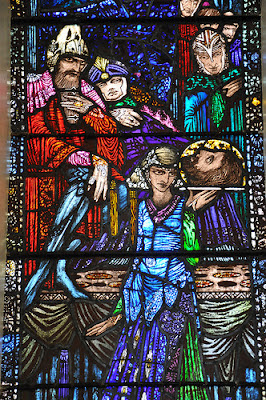Women Behaving Badly
There are some really horrible stories in the Bible. This is about one of them.
Today's name in the Anglican calendar is 'The Beheading of John the Baptist'. You get the picture? This is not going to be a fun post.
Digitalnun has posted a reflection on this here that is well worth reading. Mine takes a different angle, a focus on the women involved.
What follows is what I wrote over on The Big Bible Project. It was published there on 14 August 2012 under the title:
Today's name in the Anglican calendar is 'The Beheading of John the Baptist'. You get the picture? This is not going to be a fun post.
Digitalnun has posted a reflection on this here that is well worth reading. Mine takes a different angle, a focus on the women involved.
What follows is what I wrote over on The Big Bible Project. It was published there on 14 August 2012 under the title:
Women Behaving Badly
Will the inspiration of strong young women who achieve their goals be an enduring Olympic legacy? I hope so, but sadly, women who achieve what they want aren’t always positive examples. Most women in the gospels provide positive inspiration. Their stories are good news, as are those of so many female athletes. But this is the post I’d rather not write in my ‘Women of the Gospels’ series – but here goes.
Who gets the prize for ‘bad’ female role model in the gospels?
The one whose example you wouldn’t want to follow – who behaves most badly? Joint gold medal winners have to be Herodias and her daughter Salome. They never met Jesus as far as I know. They had a goal, at least Herodias did. They did what was necessary to achieve it – not an Olympic medal, but a good man’s head served up at a birthday party. How disgusting is that?
Who were Herodias and Salome?
They were privileged, wealthy and royal. Their family relationships were complicated by political intrigue, cruelty, polygamous and incestuous relationships.
Herodias was a grand-daughter of Herod the Great who had 10 wives. She married Philip I, a son of Herod the Great and also her half-uncle. They had a daughter called Salome. Then she got involved with her husband’s brother Herod Antipas (also her half-uncle) and he married her while her 1st husband still lived and his 1st wife still lived. John the Baptist publicly criticized this illegal marriage. To silence him Antipas threw him in prison, probably encouraged by Herodias who hated John the Baptist and wanted him dead.
Herodias’ daughter Salome only gets a walk-on part, or should I say dance-on part in the story. She’s not even named in the 2 gospels. We know her name because a 1st century Jewish historian Josephus recorded it. She was probably a young girl in the story I’m about to tell.
What’s the story?
Herod Antipas held a birthday party, a large public affair to which all the elite of the Galilee region were invited. It was intended to show what a generous good ruler he was. Probably instructed by her mother Herodias, Salome danced before the guests, a shameful thing for a woman to do in such a public event. Instead of hustling her away, Antipas was so pleased by Salome’s dancing that with a solemn oath he offered to give her whatever she wanted. Salome went to her mother Herodias to ask what she should request. Prompted by her mother Salome asked,
“Give me the head of John the Baptist here on a platter.”
What a dilemma for Herod Antipas! He was afraid of John the Baptist’s influence but also fascinated by him. His better instincts might have continued to protect John the Baptist in prison, but an oath was an oath and he didn’t want to lose face before his guests. His wife and step-daughter had trapped him. John was beheaded and his head was presented on a silver salver to Salome who took it to her mother.
Manipulative Women
Herodias and Salome lacked the political power that belonged to their male relatives. Women without power have often found ways to manipulate powerful men by playing on their fears. Herodias knew how to do this to serve her own purposes and didn’t care who suffered as a result. She misused her daughter’s charms to achieve her vengeful and gruesome goal. She wanted John the Baptist dead and with her daughter’s help she got her way. So yes, gold medal for women behaving badly.
Where’s the good news?
Finding good news here is impossible. It’s bad, disgusting, horrible, unjust. To find good news you have to go to the wider gospel story. God’s work doesn’t end when the prophets he sends are killed. The working out of God’s purposes of love cannot be stopped by the worst that people can do to each other. God’s love overcomes evil subterfuge, destruction and death. God’s love dances in resurrection light. That’s the hope I try to hold on to in bad times.
For Further Study
Read the stories in Matthew 14: 1-12 and Mark 6: 1-29
Take a look at Flavius Josephus’ Antiquities of the Jews Chapter XVII for contemporary historical background.
For Reflection or Discussion
Should Herod Antipas have broken his solemn promise to his step-daughter? Why didn’t he?
Have you ever done something you have later regretted in order to save face or through fear or hatred?
Can you find good news in the story of the beheading of John the Baptist and the women’s part in it?
Image Credit: Fergal of Claddagh on Flickr, CC Licence

Comments
Post a Comment